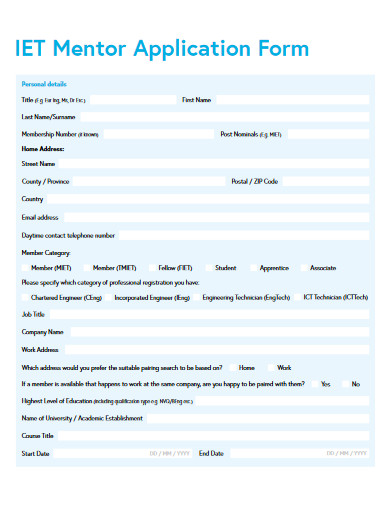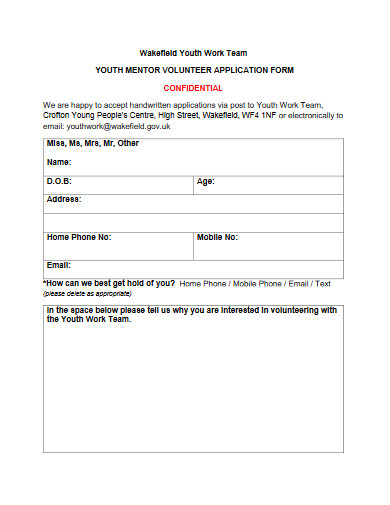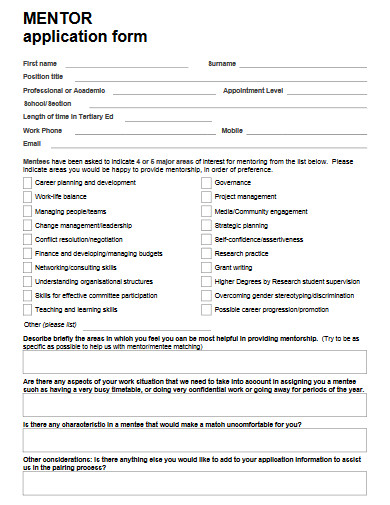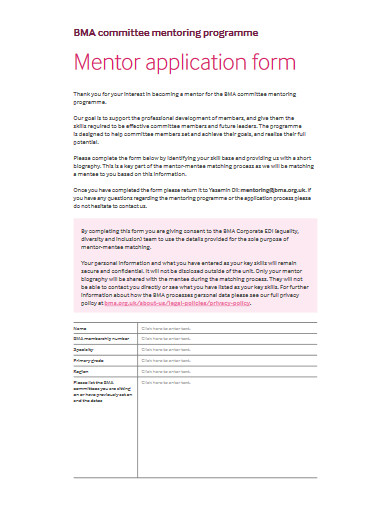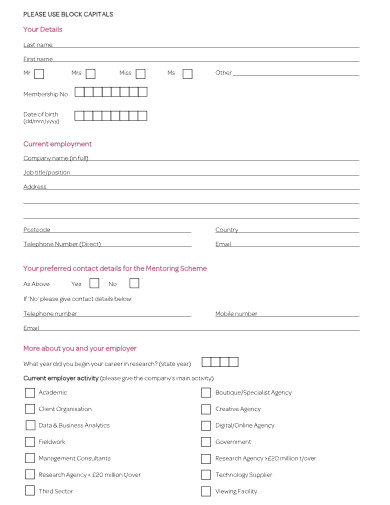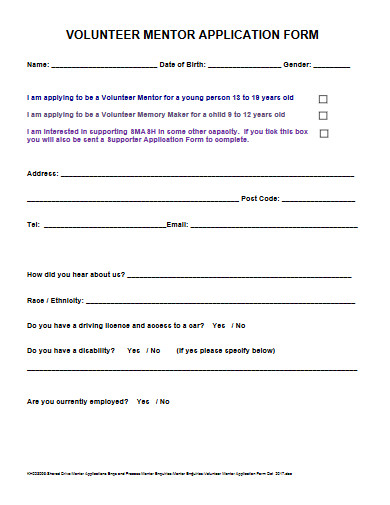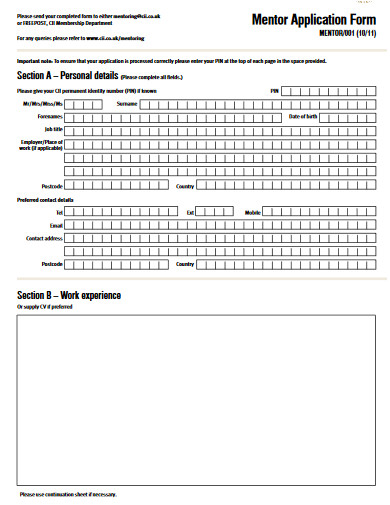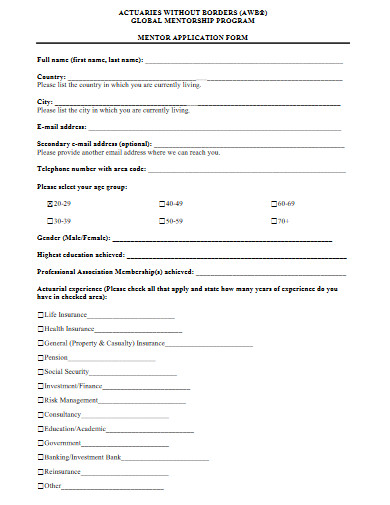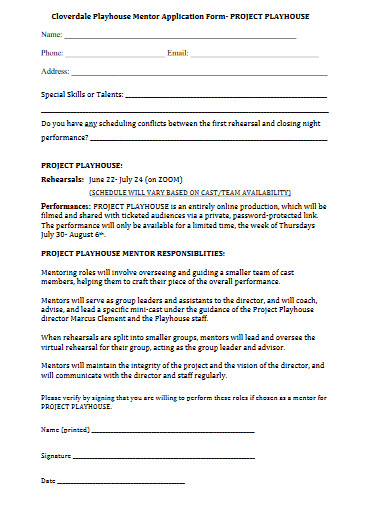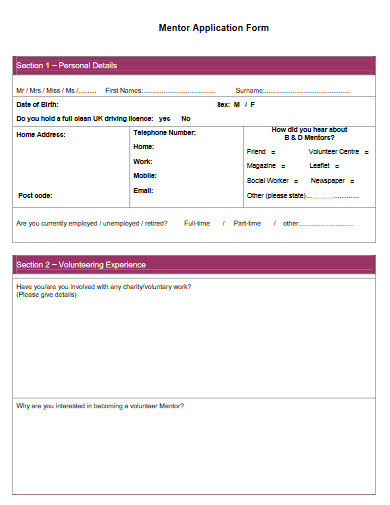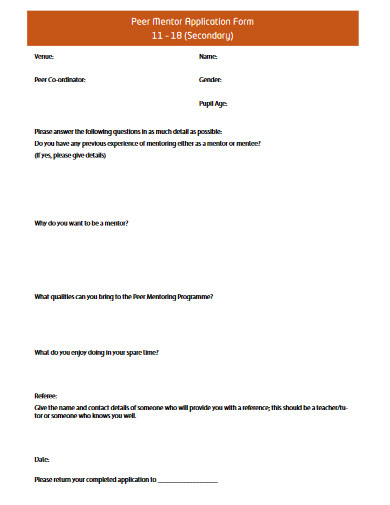10+ Mentor Application Form Examples to Download
Many say that the youth is the future of the country. Well, they’re not wrong. But before they can take over the current leadership responsibilities, they have to become a protege to gather their much-needed experience and knowledge. Such a process is what we know as a mentorship program. We are first introduced to it in schools and colleges as students, and with our teachers or professors as our mentors. The process will continue throughout our career or business ventures. Surely, mentoring these younglings, providing them evaluations, and giving them motivations on becoming good professionals in their respective workplaces is rewarding. If you want to help out the future leaders, then start gathering suitable mentors right away! You can do so easily by creating mentoring or coaching application forms! Learn how to make one with the help of our article and examples below!
10+ Mentor Application Form Examples
1. Mentor Application Form
2. Youth Mentor Volunteer Application Form
3. Sample Mentor Application Form
4. Committee Mentor Application Form
5. Mentor Application Form Example
6. Volunteer Mentor Application Form
7. Mentor Scheme Application Form
8. Mentor Application Form in PDF
9. Project Mentor Application Form
10. Basic Mentor Application Form
11. Peer Mentor Application Form
What Is a Mentor Application Form?
A mentor application form is another type of form that is made to gather information and evaluate an applicant who’s looking to become a mentor. Its content may include a course evaluation questionnaire that tests certain qualities from the applicant, including the communication, analytical, negotiation, problem-solving, and listening skills. The document also takes into account his or her work ethics. Mainly, such a document is used as a preliminary testing tool for a recruitment process. This only means that the rest of the recruitment activities will be easier and smoother to complete through it.
Qualities of a Good Mentor
Anyone can claim that he or she can be a mentor. However, corporate entities, educational institutions, or other organizations do not recruit someone just by mere affirmations. They develop their own decision criteria, which they put in recruitment checklists to know who deserves a spot in their organizations and who do not. If ever you’re wondering what these criteria are composed of, here are some of the best qualities a mentor should have.
– Capable of communicating his or her mastery on a certain field
– Always comes in prepared for every mentoring session
– Approachable and a good listener
– Provides honest feedback in a professional approach
– Willing to learn more together with his or her mentee
– Objective-driven but with fair treatment to his or her mentee
– Compassionate and unique
How To Create a Mentor Application Form
Making a mentor application form might be an easy task. But just like any other form, it comes with challenges. The ultimate challenge that organizations have to face is asking the right pieces of information and questions. To help you get past that challenge, follow our outline and insights below.
1. Ask for the Basic Information
Application forms always start with fillable spaces that ask for the applicants’ basic information. These pieces of information have to include the aspiring mentor’s name, address, sex, birth date, and contact information. These details are not just applicable for application forms, but also in many process documents.
2. Know the Educational Background
Mentors specialize in a specific field, and their educational background is a good factor that can ascertain their respective specialties. For this very reason, you have to ask them to give you that detail. To be specific, you have to ask for the names of the schools they attended, what school year they attended the schools, their course, and what year they graduated.
3. Inquire About Relevant Employment Experiences
Another good factor that verifies the applicants’ claimed specialty is the employment experience. But not just any employment experience, it has to be relevant to the specific field of mentorship that your company is looking for. For example, if your company lacks managerial staff, then the applicants must have experience in managerial positions to be deemed suitable.
4. Know the Purpose of Application
After gathering the basic information of the applicants and their educational and employment background, know the very reasons they want to be integrated into your company. Doing so doesn’t just let you know the purpose, but also lets you know how well they can communicate through writing and how well their reasonings are.
5. Set Test Questions
In case you don’t know, there are four types of questions that you can ask your applicants through forms. They include open-ended questions, specific questions, motivation questions, and unconventional questions.
Open-ended Questions – This refers to the questions that don’t have a specific answer. For instance, “Tell me about yourself.”
Specific Questions – These types of questions require concrete answers. For example, “What was the biggest project in your previous job?”
Motivation Questions – As the name suggests, these questions will try to get the applicant’s motivations. A good example would be, “Where do you see yourself in five years from now?”
Unconventional Questions – These questions are often made to make the mood lighter. For example, “If you were a fish, what kind of fish would you be? Why?”
FAQs:
What are the different types of mentors?
According to the mentoring service provider River, there are seven types of mentors. They include the traditional mentor, reverse mentor, peer mentor, aspirational mentor, practical mentor, coping mentor, and identity mentor.
What are the roles of a mentor?
In Michelle Wright’s blog for Ye! Community, she summarized the roles of a mentor into three and called it as the three C’s of mentorship. The three C’s stand for consultant, counselor, and cheerleader.
As a consultant, it is a mentor’s role to provide expert recommendations to the mentee.
As a counselor, mentors listen to their mentees’ dilemmas and guide them towards the appropriate resolutions.
As a cheerleader, mentors have to provide support and encouragement to their mentees.
How many phases does a mentoring program have?
Mentoring has four phases. They include preparation, negotiation, growth development, and closure.
Aside from acquiring the necessary knowledge, skills, and experience, mentoring is a great way for mentees to form social networks while keeping in hand personal support. In other words, it helps increase the chances of the mentees to become successful. When hiring a mentor, you have to make sure that you get only the best. The perfect tool for you to do so is through a mentor application form.



